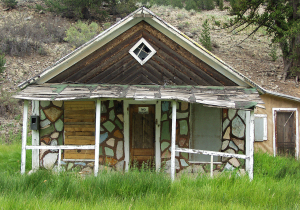by George Sibley
With the holiday season upon us and 2014 gimping off, it’s that time of year when we try to slow down a little, contemplate the past year and plot a trajectory into the new year. But thanks to the recent election, the coming year looks like a mere continuation of last year, another year “in the meantime.” By that I mean this ongoing “mean time” that we’ve been slogging through since – well, I would say since the “Reagan Revolution” back in the 1980s, when the American selfocracy finally got its old act back together after the oopsies of the 1920s, and began to turn the whole nation mean again.
Most of my problem with this probably stems from the fact that I grew up in what appeared to be a generous time in America, an open, positive and often exciting time. That’s not to say it was an easy or uncontentious time for the American experiment. I was born on the eve of our investment of soldiers as well as dollars in World War II, and I came to consciousness, as it were, during the Cold War. The Sixties, when I was finishing my K-16 education and trying to become a participating citizen, were turbulent times domestically: racial issues, environmental issues, economic issues, sex-and-gender issues, labor-and-owner class issues. But all that notwithstanding, there was a sense that we could work it out, work through our remaining social, racial, economic and cultural issues – people did not automatically sneer then when someone asked, “Why can’t we all just get along?”
The national government, for example, was actually governing – and had been since the 1930s. Fifty years ago this passing year, Congress managed to pass a Civil Rights Act and a Wilderness Act, both involving several years of major philosophical and cultural wrangling in both houses. But the wrangling happened in a generally civil way, the kind of horse-trading that left the purists on both sides of each issue lamenting the loss of their position’s integrity. But that’s the way that governance by, for and of the people works; and fifty years later, both acts have been mostly successful. (Otherwise, their enemies wouldn’t still be working so hard to undo them.)
Money and television had not yet totally corrupted the national political process; we could still believe House Speaker Sam Rayburn when he said, “If you can’t take their money, drink their whiskey, screw their women, then vote against ‘em, you don’t deserve to be here.” It is impossible to imagine the kind of bipartisan vision that created a Civil Rights Act, or the National Environmental Policy Act half a decade later, with an NFL winners-and-losers paradigm the Republicans have forced on – now – both houses of Congress.
I would argue that in the period from the 1930s through the early 1970s, we Americans were building the infrastructure for the democratic republic the founding fathers had envisioned “as through a glass darkly,” but whose progress which the boisterous hogs-at-the-trough epoch of national expansion had precluded through the 19th century. Only when the hogs at the trough overreached in the 1920s and all but destroyed the global economy, and we were fortunate enough to elect a visionary leader (rather than the madmen other nations chose to follow) – only then were we able to actually begin to create the economic, social and physical infrastructure for self-governance that made us the envy and exemplar of the world by the 1960s. Every so often I have to review what we’d done by the early 70s, just to remind myself what humans at their best can do.
On the socioeconomic front, the old 19th-century law of the jungle was being supplanted by programs fulfilling the constitutional mandate to “promote the general welfare” and “secure the blessings of liberty.” Social Security was an “all for one and one for all” system that gave the old and disabled the opportunity for a life beyond the workforce, rather than having to retire to a chimney corner with the forbearance of their kids. A safety net was constructed for those bushwhacked by illness, layoffs or other unmanageable challenges. Through the Rural Electrification Administration (REA), the government enabled the nation’s farmers to empower themselves with what the private sector refused them. When I went to college, the costs were still low enough and the grants and scholarships abundant enough so that I could graduate with only a $500 debt, because I chose to take part of my last college summer off for a transcontinental motorcycle trip – but with a feeling of indebtedness to the great society that wanted me to be educated enough to further build it.
American workers had been finally given the right in the 1930s to get themselves as organized as the owners and managers were, enabling them to negotiate for a share of the vast productivity increases technology was bringing to industry. Yes, jobs were being eliminated by new technology, but it was an expansive time, and the working class joined – became – the middle class.
The wealth of the nation was, in sum, being shared pretty reasonably; the innovators and risk-takers could still get rich, but they didn’t get it all – and they didn’t get a tax-free ride on the publicly funded infrastructure of “general welfare” and “domestic tranquility” that was foundational to private-sector success.
Speaking of that infrastructure – from the “New Deal” programs of the 1930s, through the postwar “swords-to-plowshares” conversion of military industries, to the big federal construction programs of the ‘50s and ‘60s, the piecemeal infrastructure for a modern society was largely completed. It’s popular today to deny the success of the New Deal, but those “guys leaning on shovels” built 650,000 miles of highway, thousands of new bridges, water and sewer systems, new schools and hospitals; the Civilian Conservation Corps created or improved 8,000 parks. In my “traveling 60s,” I watched the biggest construction project ever undertaken, the Interstate Highway System, take shape – on every trip, new sections were coming online and linking up.
Because I came to consciousness in the middle of this unfolding “Generous Epoch,” I naturally assumed that the society surrounding me in the 1950s and ‘60s was the world the way it should be. I learned from my parents, who had Depression scars, and from history classes at school that things had not always been the way they were beginning to be in America, but that knowledge only seemed to reinforce the progressive idea that human beings were on the track to a truly equitable, open and civil society – here, at least (and that once the Communists saw the light, the whole world would be on the same track).
Naïve? Of course. I could understand the “malaise” that came over America in the late 1970s, with the first oil shock on top of the bad news trickling, then pouring in as a consequence of our newfound national “environmental awakening.” Okay – so we’d moved too fast and not always wisely in some areas: time to reconnoiter, clean up some messes and plan out the rest of our incomplete cultural project a little more carefully.
But then we elected Ronald Reagan, with his promise to return to the good old days – to take down those first tentative solar panels, kill the unions, deregulate everything that could be deregulated and basically reopen the trough to the hogs. Okay,so get the ya-yas out, but we’ll see our mistake soon enough – remember the savings-and-loan debacle? – and get serious again about finishing the great society we’d spent almost half the 20th century working on.
But now we’re forty years into the Reagan Revolution and have descended as deeply into the mean times as we’ve ever been. Elevate personal wealth as the ultimate cultural good. Demonize those born or cast into poverty. Take down the safety net to improve the character of those so stupid as to get sick or laid off. Eliminate all “big government” that has any function beyond protecting the new selfocracy of wealth. Divert any remaining public dollars into the accounts of the deserving rich. Build walls around this nation of immigrants to keep new immigrants out. Let the physical infrastructure crumble until the private sector figures out how to make its uses profitable. In general, abandon as too impractical or expensive any idea of an equitable and open society that supports the well-being of all.
So I come to this time between years, this mean time now in its fourth decade, full of gratitude for having been around during the Generous Epoch, which now looks like a mere blip in the natural history of a species again recommitted to the same old look-out-for-number-one law of the jungle.
I do still see seeds of that vision of an equitable, open and generous society at the local level – the “locavores” working on developing communities that can feed themselves, Coloradans all over the state trying to work out the water infrastructure of the 21st century, people out in the headwaters here trying to repair inadvertent wounds to the land, substantial local efforts (however reluctant) to take as many species besides ourselves into whatever the future will be.
But all of this takes place in a cultural environment of bad weather, of serious meanness – now reinforced further by the recent election. Happy New Year!
George Sibley “essays” from Gunnison, where he has just completed a new expanded edition of his essay collection, “Dragons in Paradise.”



